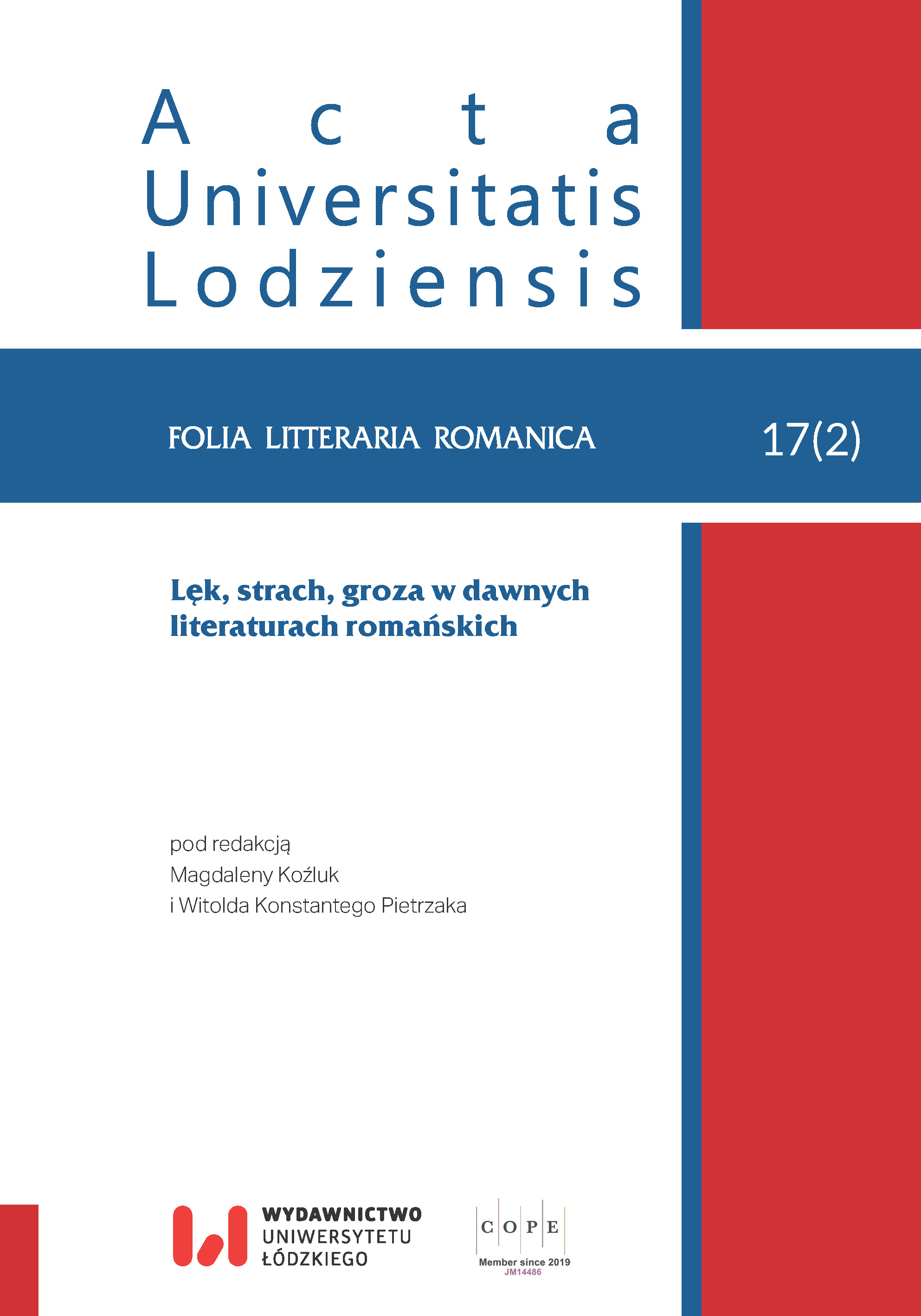Love and Fear in Giovanni Boccaccio’s The Decameron
DOI:
https://doi.org/10.18778/1505-9065.17.2.07Keywords:
The Decameron, plague, love, fear, death, nobility of spiritAbstract
In the Introduction to the First Day of the Decameron Giovanni Boccaccio depicts the Black Death pandemic and also portrays the devastating effects of death on emotional states of Florentines. Although the plague doesn’t enter the artistically ordered world of the Decameron’s storytellers, death and fear are still present in the novellas. Therefore, a question may arise, how is it possible that the novellas which were written to bring comfort often show dramatic events? To approach this issue the article aims to examine various relations between love and fear. It turns out that in the reconstruction of the world devastated by the plague, it may be helpful, among other things, to return to the ancient chivalrous values and the concept of courtly love, which only noble individuals can truly experience. What is important, nobility of spirit according to Boccaccio is not determined by either gender or social origin.
Downloads
References
Battaglia, Ricci, Lucia, Boccaccio, Roma, Salerno Editrice, 2006
Google Scholar
Boccaccio, Giovanni, Decameron, a cura di Amadeo Quondam, Maurizio Fiorilla, Giancarlo Alfano, Milano, BUR, 2015
Google Scholar
Boccaccio, Giovanni, Decameron, a cura di Vittore Branca, Torino, Einaudi, 1980
Google Scholar
Boccaccio, Giovanni, Dekameron, tł. Edward Boyé, tekst poprawił, uzupełnił i przedmową opatrzył Mieczysław Brahmer, PIW, Warszawa 1975, t. 1
Google Scholar
Carrai, Stefano, “Il sogno di Gabriotto (“Decameron” IV.6)”, in Studi vari di lingua e letteratura italiana in onore di Giuseppe Velli, Milano, Cisalpino Istituto Ed. Universitario, 2000, s. 179-185
Google Scholar
Di Girolamo Costanzo, Lee Charmaine, „Fonti”, in Lessico critico decameroniano, a cura di Renzo Bragantini, Pier Massimo Forni, Torino, Bollati Boringhieri, 1995, s. 142-161
Google Scholar
Fleming, Ray, „Happy Endings? Resisting Women and the Economy of Love in Day Five of Boccaccio’s Decameron”, Italica, 1993, t. 70, no 1, s. 30-45, https://doi.org/10.2307/479987
Google Scholar
Luigi, Russo, Letture critiche del Decameron, Bari, Editori Laterza, 1971
Google Scholar
Manikowska, Halina, „Topos czy rzeczywistość? O czarnej śmierci raz jeszcze”, Studia źródłoznawcze, 2015, t. LIII, s. 17-54, https://doi.org/10.12775/SZ.2015.02
Google Scholar
Passavanti, Jacopone, Lo specchio della vera penitenza, a cura Filippo Luigi Polidori, Firenze, Felice Le Monnier, 1863
Google Scholar
Perrus, Claude, « La ‘chasse infernale’: des ‘exempla’ à la nouvelle V, 8 du Décaméron », in Le mythe de la chasse sauvage dans l’Europe médiévale, éd. Philippe Walter, Paris, Champion, 1997, s. 125-139
Google Scholar
Picone, Michelangelo, “L’”amoroso sangue”: la quarta giornata”, in Introduzione al Decameron, a cura di Michelangelo Picone, Margherita Mesirca, Firenze, Franco Cesati Editore, 2004, s. 115-140
Google Scholar
Picone, Michenagelo, “Un dittico di novella cavalleresche: Nastagio degli Onesti e Federigo degli Alberighi (V.8 e 9)”, in Boccaccio e la codificazione della novella. Letture del Decameron, a cura di Nicole Coderey, Claudia Genswein, Rosa Pittorino, Ravenna, Longo Editore, 2008, s. 235-256
Google Scholar
Surdich, Luigi, Boccaccio, Roma/Bari, Il Mulino, 2001
Google Scholar
Terrusi, Leonardo, “Ancora sul „cuore mangiato”: riflessioni su Decameron IV,9, con una postilla doniana”, La parola del testo, II (1998), s. 49-62
Google Scholar
Downloads
Published
Versions
- 2023-08-10 (2)
- 2022-12-30 (1)
How to Cite
Issue
Section
License

This work is licensed under a Creative Commons Attribution-NonCommercial-NoDerivatives 4.0 International License.













